
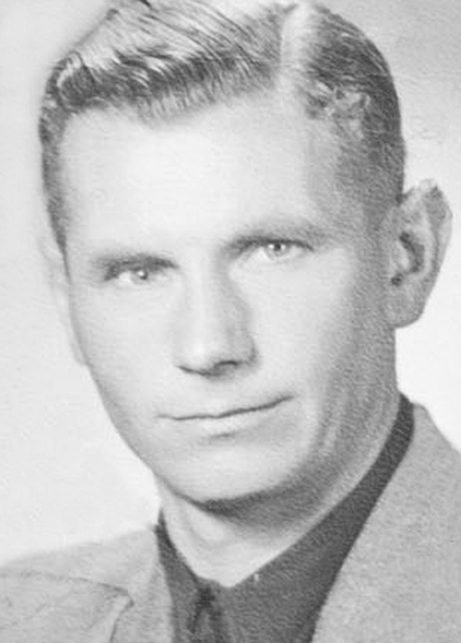
[Above: Erich in 1956.]
Interview with Erich Klein, captain of the 60th Infantry Division and later the elite Feldherrnhalle Divison, where he was awarded the coveted German Cross in Gold. He fought in Greece, the Balkans, the Eastern Front and was at the Battle of Stalingrad. After the war ended he was sentenced to a 25 year prison term from the Soviets, but was paroled in 1953. He returned to Germany hardly able to walk. In 1962 Klein joined the German Federal Army as a major of the reserve. Essen, 1990.

Thanks for letting me speak with you. Can I begin by asking how you came to join the army?
Erich: The BW [Bundeswehr] or the Wehrmacht? I had just finished school and then the war broke out so I was called to duty. I was very young back then. I was required to report for training in the army, which I did. So you could say I had no choice in the matter, as you could be punished if you refused military obligations.
To be a soldier back then was a very high honor, and it was a special status in society, so very few would ever refuse. When one reported to training it was a grand affair, many would come to see you off and they had a parade for when you entered into the barracks. We wore our civilian clothes and the people would throw flowers and kisses to us.
You mentioned you saw action in the Balkans, what was that like?
Erich: For me it seemed very fast, I will say. The Yugoslavs asked for German military intervention as a coup [supported by the British after the king signed a pact allying with Germany] was happening and the region was in turmoil thanks to Mussolini. He invaded Albania and Greece, which set the British in motion to come into Greece; this posed a problem to Germany.
Hitler wanted to secure our southern flanks, and so ordered a full invasion of the region. When we went in we faced only light resistance at first. I remember many of the people welcomed us and did not treat us as the enemy. We came upon military units who came out with white flags wishing to surrender.
Some Serbian army units did put up a fight, however. I remember Belgrade was bombed as they declared it a fortress city to be defended to the last man. They inflicted casualties on German units and made stands, but our Panzers and Luftwaffe [German Air Force] broke their lines pretty easily.
The campaign moved into Greece, where there was strong resistance from Greek forces and their allies. German units always seemed to be able to best the enemy with flanking moves. The SS and paratroops beat back the British and forced them out of Greece, capturing many.
I remember seeing the prisoners, they were quite jovial, and for them the war had not turned ugly yet. They had an air of a sports team who had just been beaten in a match. This campaign was marked by fair treatment, I can attest. The British troops I met thanked us for being such fine soldiers and treating them well.
I saw our men trade for food, cigarettes, and other trinkets; there was even some singing from popular songs of the day. Our men ate with them and there were no hard feelings, it was as if brothers had found each other.
Even the Greeks were very pleasant; they spoke of the fairness and civility of the German soldier. The civilians welcomed Germans and gave food and wine as a sign of peace, which was surprising. The whole campaign was very quick and overall the Wehrmacht suffered light losses while dealing the British a defeat.
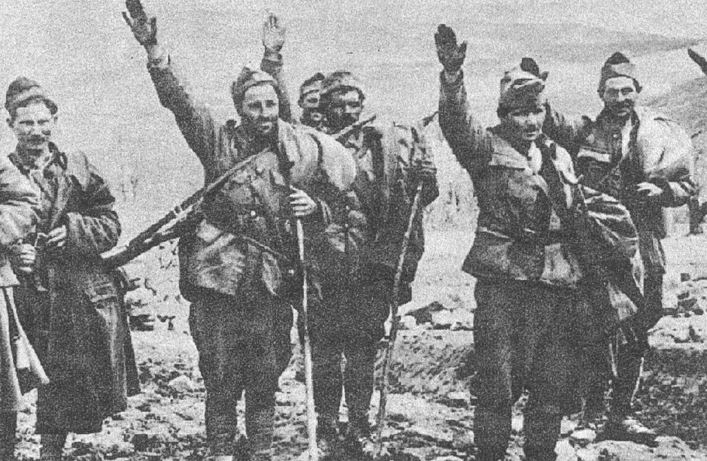
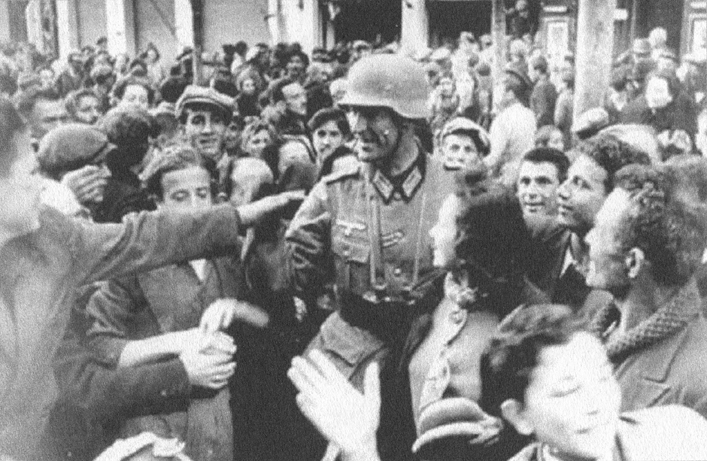
[Above: (left) Greek soldiers surrender to German forces with Roman salutes. (right) Thessalonians heartily welcome the Germans.]
I understand you also fought on the Eastern Front, what was that like?
Erich: Yes, I was with the 60th Infantry Division as a junior lieutenant. We were part of Group Kleist in the southern part of the front. It was hot and very dusty, I remember. We were upgraded to a motorized infantry division but still there was much marching to be done.
The opening attacks broke the Russian lines and when the attacks started, many Russian divisions were surrounded, and had to be dealt with. This caused us to lose time even though these pockets were easy to clear. I have to state that we began to see the fanatical side of their soldiers.
We started to see evidence of executions and mistreatment. One of our men from the recon unit was found tied up and shot in the head. I saw reports come in from other divisions reporting the same.
You must know the Russians looked down on the Ukrainians, they considered them to be too independent minded. Stalin tried to kill them off in the early 30s by causing a famine [Holodomor, 1932]. I met a girl who was at my school who fled in 1930; she told us how bad it was under Stalin.
I was now seeing firsthand what she meant. We were welcomed as saviors wherever we went. They threw flowers down at our feet, offered water, bread and salt as a humble way to welcome us. In one town we came to, the people quickly took us to some woods where they showed us execution sites.
The NKVD [Soviet secret police] killed many who they viewed as unreliable and unpatriotic, there had to be thousands who lost their lives in the first days of the campaign due to them. We saw the wives and children crying while telling our interpreters about family who were taken away.
Something I must say to you here, I also saw Jews who had been killed. The Ukrainians blamed Jews for turning in their people to the NKVD. When the Soviets retreated, the people formed mobs and attacked Jews all over the Ukraine. This is now blamed on us, but in reality it was the Ukrainians who took out revenge.
I personally saw a Jewish man who had been hung; I was told the sign around his neck said "I am a Jew, I killed Ukrainians". I believe these actions caused some Jews to flee and form the partisan bands later on.
I was there for the winter of 41/42; it was the worst in recorded history. We had to face attacks that were made to keep us from moving north. The 60th held our lines against severe attacks. We tried to go on the offensive to keep the Russians at bay when we could, but it was very difficult.
Our supplies of winter equipment were not sent as they should have been, so many men got frostbite and were sent to the rear to heal. Our motors would not start, the oil and grease for the weapons froze solid, and nothing worked. We had to build shelter as the Russians practiced scorched earth; they burned down many towns and villages.
The people who had hailed us earlier now asked for help with food and rebuilding, but we had little we could give. Many were sent west or into Romania so they would have a chance to survive the winter I remember.
In the spring we faced the Russian offensive [General Semyon] Timoshenko and this was quite a battle for us. We were able to defeat his massive force and take whole armies prisoners. I saw those long columns which surpassed what I saw at the beginning. I saw mountains of equipment, tanks, tractors, and trucks.
I will tell you I realized at the very beginning we bit off more than we could chew. The Soviet Union was massive, with a population more than double ours. It was foolish to think we could have defeated such a country. It is not true that they had inferior weapons, indeed the T-34 [tank] out matched anything we could field in 1941. For God's sake they threw their women into the battles as well. I saw this, and it shocked me, no western nation has ever forced women to fight.
Many of our men favored the PPSh-41 [submachine gun] over our MP 40 also, and they would fight over who could have one. We took on a well-prepared, well-armed, and well-motivated Goliath; David could not win this one.
You saw action in Stalingrad; can I ask what it was like for you?
Erich: Yes sir, my division was in the north of the city. We punched through heavily defended lines and reached the city. The Russians declared it a fortress city, to be defended to the last man. The Luftwaffe was given the okay to bomb it, and I remember seeing the plumes of smoke after the raid.
This only seemed to help them as they turned ruined buildings into fortresses, which made it hard for us to crack. The battle went very well for us, we were able to take 70% of the city, and push the Russians out. Right when victory was at hand, it was snatched away from us when [Georgy] Zhukov attacked our allies, and surrounded our forces.
It was fortuitous for me I suppose, that I was allowed to go home on leave, and when I came back the city was surrounded. I was put into the alarm units that were to break the siege; I was now in [German army commander Hermann] Hoth's 4th Panzer Army. We had to move in very bad weather, and the Russians expected us.
We made good headway at first, but they were able to threaten our flanks, and our allies had been shocked and broken. They were of no use any longer as they lost their nerves and will to fight. The farther we advanced, the more pressure we had on the flanks, and more units had to be sent to defend, weakening our attack.
In the end it was called off, and I remember the anger of the men. Many men were in the same boat as me, they had either been wounded, in training, or on leave. We wanted only to return to our men, and were quite angry when that did not happen.
We felt utterly defeated and hopeless, thinking how could it come to this? We were beating the enemy even though they had greater numbers in men and equipment. We always seemed to prevail, and now we had been beaten. It was with a bittersweet feeling that I listened to the announcement of the end in Stalingrad.
It was a very tough battle that was marked by non-stop fighting, even in the beginning I remember the supplies we needed did not always arrive. We would be expected to care for the civilians as well, they refused to evacuate like they had been told to do. In the beginning they would be caught up in sudden firefights and Russian shelling.
We started using them as helpers, to cook, do chores, and mend uniforms. This did not last long, as the battle became fluid they were sent away so they did not fall into enemy hands.
Out of my comrades and men who went into captivity there, only a couple ever came home again [of the 100,000 men who surrendered at Stalingrad, only 5,000 survived!]. The Russians have claimed they liked the Soviet Union so well that they stayed and married a fat babushka [Russian, meaning 'grandmother' or 'elderly woman'], but the truth is they were all killed for the crime of answering their nation's call to arms.
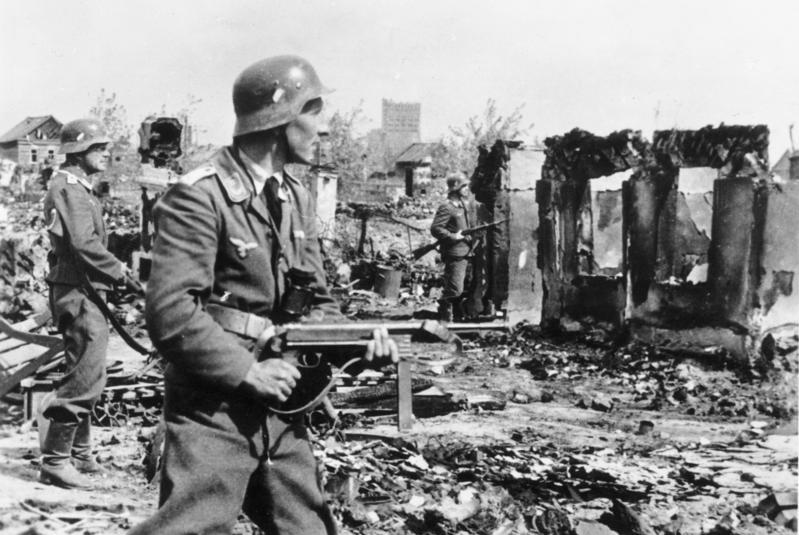
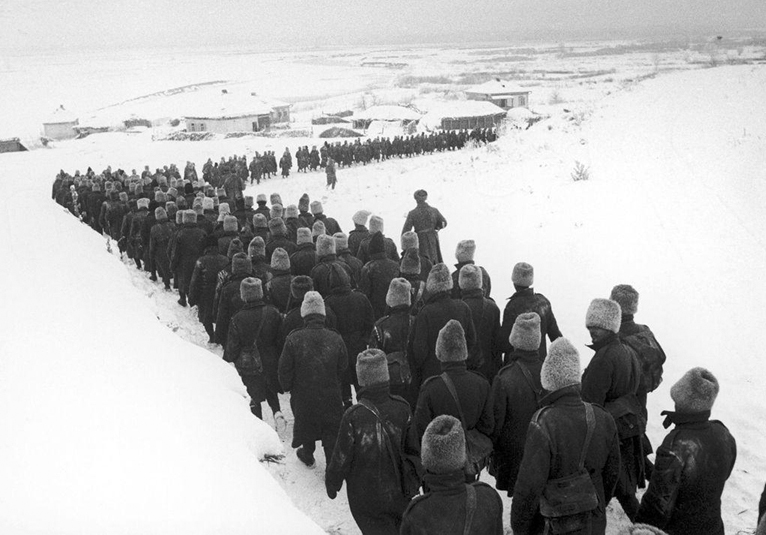
[Above: (left) German soldiers clearing the streets in Stalingrad. (right) A long column of Romanian POWs captured by the Soviets at the Battle of Stalingrad.]
You were awarded the German Cross [in Gold], how did it feel to win this award?
Erich: Back then it felt very good, it was a prestigious award, and one would be proud to wear it. I was in the mobile artillery, and our battery gave the Russians something to think about. We were instrumental in breaking up massed attacks by their infantry, and sometimes would engage their armor.
I was awarded the Cross for many examples of successful actions but it was my comrades who made it possible for these actions to be successful. My men held a great dinner party to celebrate this award, and I remember getting telegrams offering heartfelt congratulations.
Today it is just a piece of metal and enamel with no significance to this younger generation.
I have read that the Russians say the Germans committed many crimes like rape, looting, and murder. Do you believe these claims?
Erich: For heaven's sake no, I think it is enemy propaganda that has only gotten worse as the years go by. You know it is funny, when I went into Russia I saw all the towns, villages, and cities the Soviets burned down or destroyed; they tried to deny us shelter.
In 1946 I was tried as a criminal for being a part of the invasion; they declared that we, the German Wehrmacht, destroyed their cities, towns, and villages. This was a lie, just like they say we killed the Polish officers at Katyn. They won so they can present the story anyway they would like to.
I know the fighting in the east was very cruel, and SS units had to hunt and fight partisans which were very unpleasant. I am told the SS did some things that brought dishonor to German arms; if they did so then the punishments were right. I am not so sure the truth is being told, between you and me.
I have spoken to some who were there and they tell a different side to what is stated today, yet they can not defend themselves due to current politics. Many will not even speak of the war for fear of being turned in or reprisals. So I do think the matter needs further examination, but on an impartial level with neutral judges.
While in the Feldherrnhalle Division I had to deal with partisans and they were the biggest lot of criminals I have ever seen, every government knows the treachery of these people. Many were tried after the war for crimes against current regimes. They would kidnap German soldiers and demand money or some form of payment.
They even took hostages from their own people and killed them. The communists like to portray them as true freedom fighters, but in truth they were vile criminals who forced our hands into retaliations that have caused problems for us today.
But I must say, the past is the past, and really should be left to die. Both sides did things that were not correct, and it only creates hate when they are brought up.
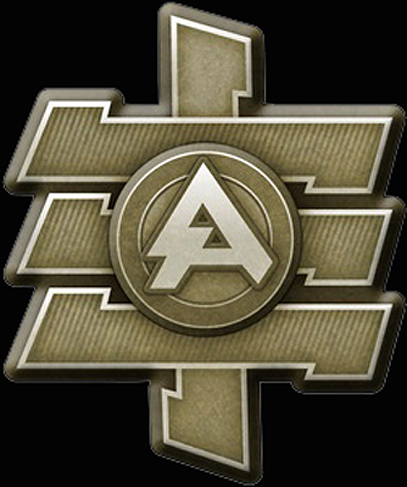
[Above: The Feldherrnhalle Kampfrune, which was authorized for use on uniform shoulder boards in June 1943.]
How did the war end for you?
Erich: In the end, I was taken as a prisoner of the Russians, and was treated very poorly, as most all German prisoners were. They put all of us on trial, they would ask you questions about the women, the food, and the crops. These questions seemed innocent but what they were doing was building a case based on false assumptions..
A comrade had a girlfriend in Rostov [southwestern Russia], he brought this up thinking they would go easy on him for liking a Russian girl. They charged him with rape and executed him because he admitted having relations with her. Another was shot because he was asked if he ever saw a Russian potato and how big they could grow. He said he enjoyed them fresh from the field; he was shot for looting from the Russian farmers.
Another I remember was shot because he admitted burning down a barn that partisans had hidden weapons in, his crime was destroying Russian property. These are the games they played with us. I was hauled before a big fat major that read my charges, and then asked if I had anything to say. Speaking anything in defense was automatic death. I was given 25 years, if you can believe it, for pillaging, murder, theft, and belonging to a criminal division.
The 60th was destroyed in Stalingrad, and I was assigned to a rebuilt division that bore the name Feldherrnhalle, after the November 9th Putsch. To them this made all of us fanatical Nazis who had to be punished to set an example. I went to the coal mines to serve my time, and it was brutal work.
They always had quotas for us to meet; if we did not meet these, then we did not eat. They regularly beat us, and encouraged us to turn on each other. It was like being in a hell that we did not ask for or deserve. This went on until finally a sense of morality fell on them, and they released all prisoners by 1955. It is said that they killed millions of prisoners in one of the greatest crimes in all of history.
Yet today they speak as if they liberated the east from us, and that we are the ones who brought death and destruction to the people. I can tell you that they are not telling a correct version. With the Soviet Union collapsing perhaps more of this will come to light so the truth can be told.
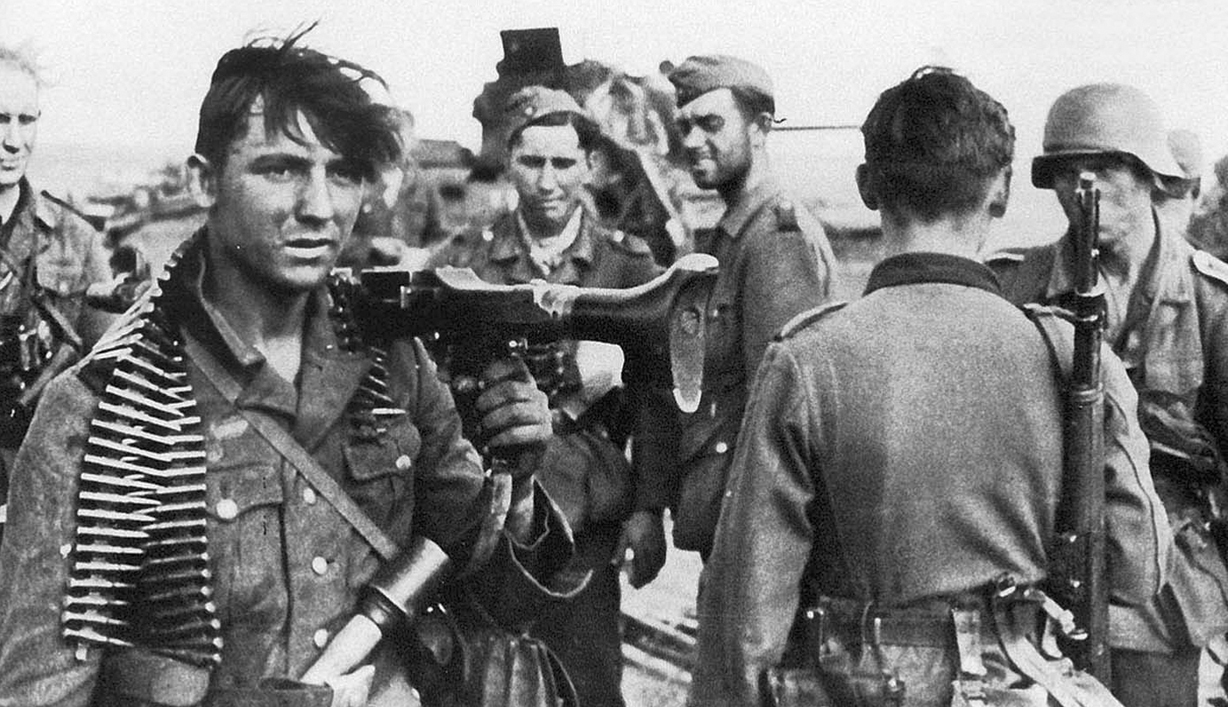
[Above: Panzer grenadiers of the 16th Panzer Division of the Wehrmacht on the bank of the Volga at Stalingrad, August 25, 1942. Over 100,000 Germans were murdered due the traitor Paulus who commanded them. He withheld food and supplies for his soldiers and prevented the breakout of his men, who could see their rescuers, but were ordered to do nothing. After Paulus' capture he quickly worked for the communists, doing radio broadcasts and other propaganda for the Soviets. Curse his name.]
Back to Interviews










